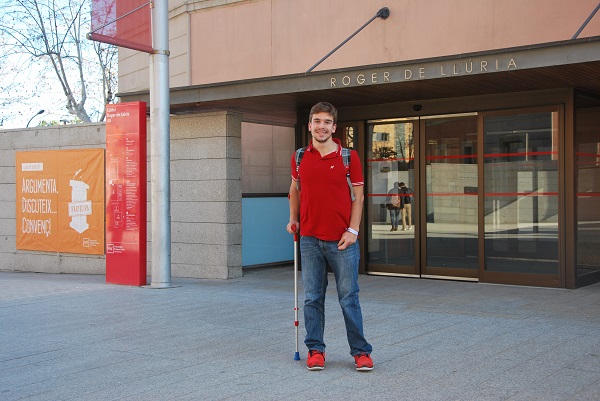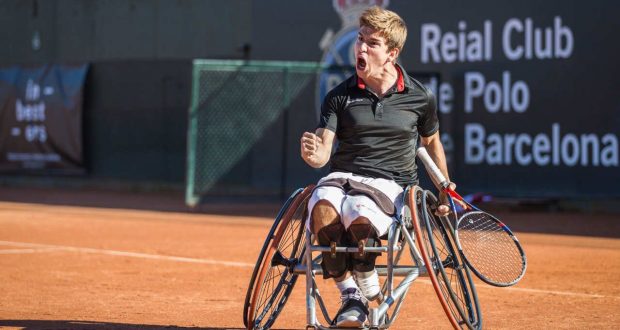“All the effort I put into tennis, if I can, I will channel into my studies”
“All the effort I put into tennis, if I can, I will channel into my studies”
Martín de la Puente is a first-year student of International Business Economics at UPF and number 19 in the world wheelchair tennis ranking. He lives and trains at the High Performance Sports Centre of Catalonia in Sant Cugat, and is on the University’s High Performance Athlete Support Scheme.

Martín de la Puente Riobó (Vigo, 1999), @tindelapuente, this 2017-2018 academic year began studying for the bachelor’s degree in International Business Economics (IBE) at the Faculty of Economic and Business Sciences, which he will combine with his facet as an elite sportsman in the discipline of wheelchair tennis.
He enjoys a scholarship funded by the Spanish Consejo Superior de Deportes (national sports council), thanks to which he lives and trains at the High Performance Sports Centre of Catalonia (CAR) in Sant Cugat. UPF is adhered to the Support Programme for High Level Athletes, which helps him combine his sport and his studies.
He is currently ranked 19th in the world for wheelchair tennis, and is the youngest player in the Top 20 of the sport. Despite his young age, he has a brilliant curriculum: he has won the world junior championships three times, he has been absolute champion of Spain three times, he has won the national master’s and obtained a diploma in the Paralympic tennis competition at the Rio Olympics in 2016 in doubles, where he reached the quarter finals.
When he was not yet five years old he was diagnosed with Proteus Syndrome, a rare disease that causes abnormal bone growth and for which he had to undergo sixteen surgical operations. When he was eight and was already playing tennis, he had to have part of his left leg amputated. Two years later, he tried wheelchair tennis. At that time he didn’t imagine all the success that was awaiting him and that he would go so far in this sport.
—How have you managed to adapt to your new university life to UPF and to Barcelona?
I came to Barcelona with a view to a period of transition. From a city like Vigo, which is small, to the enormity of Barcelona, which you can’t compare. I was expecting some tough years, since at the start, new stages in life are not at all easy. I am very pleased with the change I’ve made, even though it has meant leaving a lot of things behind, such as the family and friends, but I think that was the right thing to do: going to the High Performance Sports Centre (CAR) and Pompeu Fabra University was the right choice, both as regards sports and academically speaking. I’ve been adapting to long journeys, to studying at dead times like the hours I spend on the train, and even between hours here at the University, and to be able to combine my studies with elite sport.
—What does your attachment to the Support Programme for High Level Athletes at UPF mean for you?
One of the reasons I tried to get into UPF was because of this help that the University offers, since not all universities have it. Apart from being a good institution academically speaking, it also focuses on high performance athletes, and on this I must say “hats off”. I am really happy to have all of the help the University can offer . Above all it provides me with compatibility between competition and the exams. Having extra time to hand work in is a bit more complicated, but I was assigned a tutor, who helps me a lot to organize myself and the teachers, because the truth is that the life of a sportsperson is a bit hectic.
—Are you taking all the subjects of the first year?
I am doing the full year, and for me that’s a real challenge. I’m used to missing class, both because of the competitions and training sessions, and this first term has been quite hard, because I really wasn’t expecting it to be so complicated. I leave the campus quite late in the afternoon and then I must train, have dinner and settle down to my studies at night. I think it is rather ambitious for my part, maybe one day I’ll have to reconsider, but I will try to go ahead with everything and do as well in my studies as I can.
—The IBE bachelor’s degree you’re taking is all in English. How are you managing?
Well, luckily I’ve been able to travel a lot, and the good thing about travelling is that you talk to people from other countries and from other parts of the world, and you end up speaking in English. It’s like applying everything I have been learning when travelling over the years to a class, which is certainly more theoretical, but I feel comfortable in English. It is a challenge to study in English and IBE is really pushing me, but I think I’m doing pretty well.
—What aspects of economics are you most interested in?
I’ve always wanted to become a company director, and the good thing about IBE is that it opens the doors to international companies, both in Spain and abroad. On my travels I’ve made quite a few friends and contacts in almost all parts of the world, and I know they have companies throughout the world. And if it’s not in Spain, I would like to go to one of those places my colleagues have mentioned. Right now I’m approaching my life as an exciting project shared between tennis and studies.
—What is a normal class day like and how do you plan it out?
The alarm goes off at seven in the morning for a quick breakfast and then I go to Ferrocarrils Catalans, to Sant Joan station, near the CAR, to Plaça Catalunya, where I take the bus and get to the Ciutadella campus at nine in the morning. It is quite long this journey, but it’s all very well connected. I usually finish classes around 2:30pm, sometimes earlier, at noon, and then I go back to Sant Cugat, to eat a quick lunch and then I train. I usually practise about three hours of tennis, more or less, and then I do my physical training, for an hour or an hour and a half. We finish at 8pm, we have dinner, and while some of my peers go to sleep, I start to study to be able to keep up to date. Organization is essential as we athletes finish training and say “I’ve done what I had to, I’m tired, I want to rest”, but I also have to fulfil my studies, which makes me push myself a little bit more. I know I chose to come here to do the two, and that one goes hand in hand with the other. All the effort I put into tennis, if I can, I will channel into my studies.
—Does your schedule allow you to make a life on campus?
We have formed rather an open group of friends at UPF, I’ve been lucky enough to join a good group of friends. I don’t spend as much time with them as I’d like, since to organize myself well, I’m always borrowing time earmarked for my social life. I am aware that I have to borrow time from somewhere, and I can’t lose hours of sleep, because we are human. Whenever I can, I try to come here to the campus with my friends, but I know that sometimes I let them down a bit.
 —What does tennis mean for you?
—What does tennis mean for you?
It is certainly one of the most important things for me, not just for the competition in itself and for all the travelling it has enabled me, but because it makes me feel like an athlete. Often kids with disabilities are regarded as being sick or disabled, but in the end I feel like a person who is doing a sport, an athlete, and I’m competing to achieve my dreams and my goals. At the beginning of all that, when I saw a wheelchair, I said: look, it’s impossible for me to sit down here and play, and in the end, after following a few competitions, I thought: these guys are athletes! And this goes for sport in general and for wheelchair tennis. This sport helps me try to improve every day to prove myself to myself and to everyone that you can be an athlete even if the worst thing in the world has happened to you.
—What are your main sports goals in the short and long term?
This season I have pretty ambitious goals in sport, but I’ve also set myself goals at the University. I know that the tennis is going very well and it’s all great, but I also want to do well in my studies. The first year is usually the most complicated and I would like to pass it without any problems. As for the tennis, I would like to gradually raise the level of training, intensifying it slowly. I am now number 19 in the world, but I think this classification is just a number that you reach due to the training you’ve done rather than by the matches that you win in tournaments. One of my short-term goals is to get in the Top 15, but I know that can only be achieved by training daily and punishing myself. In the long term, I have far more ambitious goals, such as trying to compete in a Grand Slam, which is rather an exciting idea, since only the top eight players in the world can enter. The Tokyo Olympic Games are just around the corner, and there I would try to achieve something big. I’m not thinking about winning a medal, but I am looking to give the best a run for their money, which, in short, is what I’m training for.
—Of all that you have achieved so far, what do you feel most proud?
The Olympic Games in Rio were very special for me. When I played my first match on Centre Court against a Brazilian I was really surprised by the people that were there, by the encouragement, the party spirit and the atmosphere among the spectators, and it is something I’ll never forget. When I recall it I get goose pimples. Every time my opponent scored a point the public acclaimed him, and I thought: how these people are shouting!, I’d better not win any more points or the stadium will come crashing down on me! And I think that was one of the best experiences of my life.
—How do you see your professional future?
When I finish uni, I would like to devote myself exclusively to professional tennis, for a few years, to see how things turn out. When I go to tournaments, I take my books; when I travel, I do so thinking about my studies, it is something that is there, and even if I say “I’ll concentrate on tennis”, it is very difficult to achieve. Later, when I have seen how my sports career ends, I would like to work, but I am sure I don’t want to lose contact with tennis: I like it a lot, almost everyone in my family plays, and it will always be present in my life.
